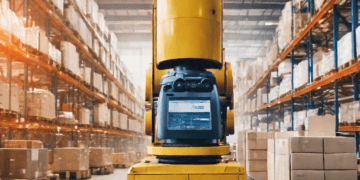In today’s ever-evolving supply chain landscape, artificial intelligence (AI) and machine learning are proving to be valuable tools for mitigating emerging risks. These technologies offer innovative solutions that help businesses adapt to the changing dynamics within the global supply chain, particularly in the context of the COVID-19 pandemic and increasing regulatory pressures.
The pandemic has not only disrupted supply chains but has also brought about stricter regulations aimed at curbing carbon emissions and reducing greenhouse gases. In Europe, new regulations now encompass emissions stemming from the entire supply chain, from the procurement of raw materials to the delivery of finished products. Furthermore, the International Maritime Organization has introduced guidelines to reduce the carbon intensity of shipping, potentially signaling the end of an era characterized by cheap international shipping.
Traditionally, companies relied on predictable performance within their supply chains, enabling them to establish geographically dispersed operations, often centered on cost-efficient Asian manufacturing. However, recent events have underscored the need for more responsive supply chains that can address unforeseen challenges with real-time information.
AI and machine learning are now aiding companies in accurately forecasting demand, optimizing inventory management, and reducing emissions and waste throughout their supply chains. For instance, a major maritime transportation provider successfully employed machine learning to analyze historical data, resulting in more reliable probability forecasts. This approach also led to waste reduction, fewer stockouts, and minimized excess inventory.
In times of rapid change, the necessary information for informed decision-making may not always be readily available or easily digestible. AI and machine learning, however, excel at identifying patterns at the initial stages of an issue while enhancing supply chain adaptability when faced with sudden shifts in demand. As a result, businesses can greatly enhance their visibility and responsiveness within their supply chains.
Additionally, AI and machine learning are pivotal in cost reduction within supply chain management. According to McKinsey, early adopters have experienced a 35% reduction in inventory expenses and a 15% decrease in logistics costs. The ability of AI to minimize errors and delays further contributes to overall cost savings.
Another significant aspect of supply chain management is the prevention of waste due to damaged or spoiled inventory, especially when dealing with fragile materials during transportation. AI-powered sensors provide real-time tracking of individual shipments, offering managers invaluable insights into inventory conditions and issuing alerts when conditions become unsafe. Furthermore, AI-driven systems can autonomously reorder materials when supply levels fall below specified thresholds.
The past three decades have witnessed tremendous growth in international trade and the expansion of global supply chains. In the current landscape, businesses must effectively manage a host of new risks while emphasizing resilience and sustainability. Those that successfully navigate these challenges are likely to be the ones that embrace AI and machine learning technologies to ensure compliance, reduce costs, and make data-driven decisions in real time.
Get the latest supply chain report news at The Supply Chain Report. Learn more about international trade with tools from ADAMftd.com.
#AISupplyChain #MachineLearningInLogistics #SupplyChainRiskManagement #SustainableLogistics #GlobalSupplyChain #CarbonEmissionsReduction #SupplyChainInnovation #InventoryOptimization #RegulatoryCompliance #RealTimeSupplyChain #CostReduction #SupplyChainAdaptability #AIinTransportation #PredictiveAnalytics #SupplyChainResilience















